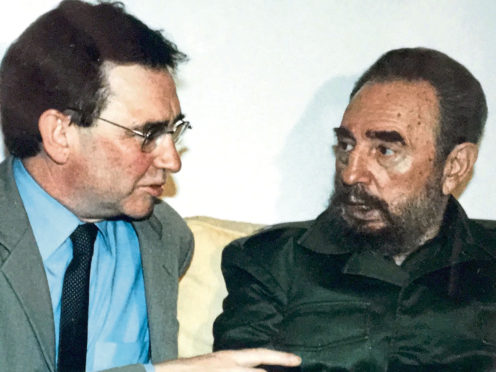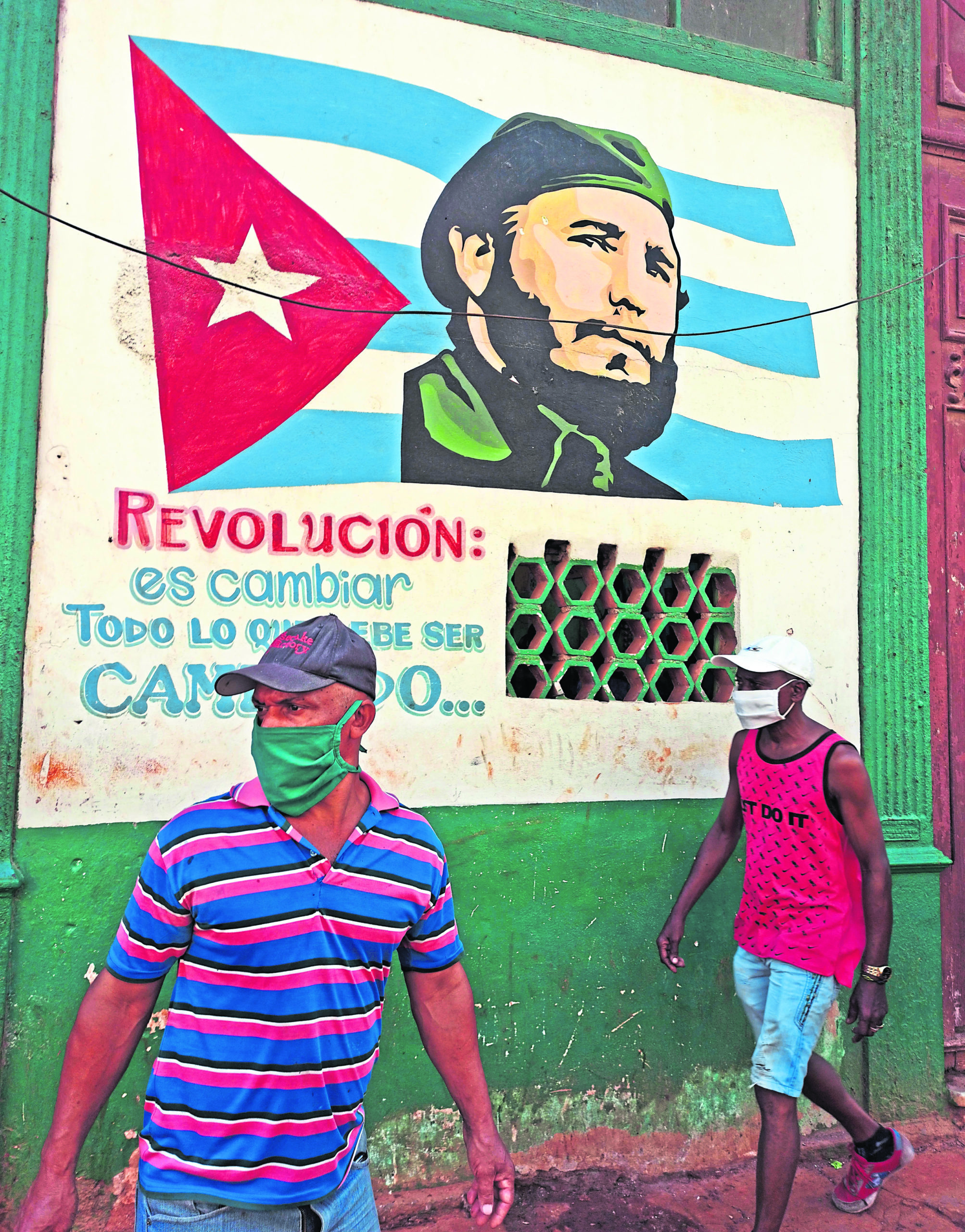“No child starves in Cuba:” Former minister hails hero of Havana as film-makers retell story of six decades of Cuban revolution – The Sunday Post

Cuba has many friends and I count myself as one. There is no need to be uncritical of any society in order to recognise what is good.
No child starves in Cuba. Literacy rates and health services far exceed those in much richer countries. That’s what makes Cuba different and in some ways inspiring.
In 1998, I became UK Trade Minister and made it a personal mission to normalise commercial relations with Cuba; an approach abandoned in the 1980s.
The first time I arrived in Havana, I went straight from the airport to dinner with Fidel Castro. It was completely unannounced and lasted seven hours.
Conversation turned to the Balkan War where Nato had intervened to protect the Bosnian Muslims from ethnic cleansing. Fidel took the predictable line of berating Nato involvement.
I told him I couldn’t believe what I was hearing. “Cuba has the most ethnically integrated society on the face of the earth, yet you would stand idly by in the face of ethnic cleansing?”
He went off on a long detour before returning to my point. “You virtually accused me of supporting ethnic cleansing,” he said. “If you don’t do anything to stop it, you might as well support it,” I countered.
I doubt if this exchange did anything to alter his world outlook but it certainly changed my perspective. Everyone knew he could talk but I had hit upon the fact he also accepted challenge and argument.
Maybe it didn’t happen often enough but it opened a fascinating chapter in my own experiences. Each time I returned, the call would come for lunch or dinner with Fidel and they were never short affairs.
I have always had the journalist’s awareness – uncommon among politicians – that the person you’re talking to has more to teach than you have to tell. That was certainly true when talking to Fidel Castro.
“Cuba Against the World” prompted a few flashbacks to these conversations – Fidel’s initial efforts to seek peaceful co-existence with Washington, spurned by Kennedy; his response to the Bay of Pigs invasion – inspired by his fascination with Second World War tactics; his uneasy relationship with the Russians, into whose arms he was driven.
Soviet subsidies propped up the economy and allowed Fidel to support revolutionary movements elsewhere. The longest-running war was in Angola where Cuban forces helped resist South African occupation and eventually won.
As one of my old Cuban friends, Ricardo Alarcon – now Deputy Foreign Minister – told the programme, the moment the war ended, the Cubans departed. Unlike others, they were not there to rob Angola of its resources.
Fidel was a micro-manager, whether running a war or nearer home. I remember visiting just after a hurricane hit the Caribbean. Thousands died elsewhere but, because of better housing and preparation, Cuba lost only three – and Fidel related the circumstances of each.
He told me about having sent “spies” – his word – to Scotland to learn how whisky was made, out of intellectual curiosity rather than commercial intent. I had brought Scotland’s finest and he produced a bottle of “Old Havana” which they continued to produce in a corner of a rum distillery.
He toasted “Tony Blair and the Third Way” while I reciprocated with “Peace and Socialism”. It was, like many others, a slightly surreal moment. Fidel had become a surprising advocate of the “third way” for Latin America – neither US-sponsored dictatorships or revolutions he had done so much to promote.
An interesting reminder from the programme was that Mikhail Gorbachev went to Havana and encouraged Castro to follow the perestroika road – a more liberal society, within communism. Castro said it wouldn’t work.
The break-up of the Soviet Union soon proved him right. In Cuba’s case, the constant fear was that Washington would exploit any weakening of the system.
The 1990s were dire after the Soviet withdrawal. The blockade, crippling in itself, was also used to justify preventable failures, including the decline in agriculture and sugar. A top-down economy did not work but reforms proved hard to implement. Cuba’s enemies were never interested in reform – only in destroying the Cuban revolution and all its works. After a brief intermission under Obama, the screws were turned again by Trump and those in Florida who support him.
It has been a deeply counter-productive obsession. Cuba will always find friends to help it survive. The victims of the cruel and illegal American blockade are ordinary Cuban people.
Fidel’s curiosity was eclectic. He once asked me about Scottish salmon farming, of which I knew a little. When he started probing about feed-to-output ratios, I gave in and promised to send an expert. Which I did.
I remember one occasion when the Czech trade minister was also present. “We will always be grateful to the Czech people,” said Fidel straight-faced, while the right-wing Czech looked nervous “… for sending us the Semtex built into hillsides just in case the Americans try anything stupid.”
I was invited to Fidel’s 80th birthday celebrations in 2006 but by then he had taken ill. Two years later, he handed over to his brother Raul. American strategy had long been to await Fidel’s death in office at which point they assumed the whole edifice would collapse. By transferring power while still alive, Fidel put one over on them, one last time.
After I left politics, the Cubans asked me back to help with a transition to renewable energy. They had become over-dependent on Venezuelan oil just as with Soviet oil which was then cut off overnight.
The upshot was a company called Havana Energy, which would build biomass plants at sugar mills. Against all odds, one of these has been completed. However, as the blockade tightened, there was only one source of investment beyond reach of American sanctions – China.
So this and much else is now backed by Chinese investment while Russia has also made a return. Meanwhile, American industry is excluded from a market on its doorstep and invited to hate it instead. Great work, Donald.
Own Man in Havana
Fidel Castro divided opinion, being both revered and demonised around the world.
Born in 1926, the son of a wealthy farmer, Castro was radicalised while studying law in Havana. After joining rebellions in the Dominican Republic and Colombia, he planned the overthrown of Cuban president Fulgencio Batista.
His first attempt, in 1953, failed, before a guerilla war forced Batista from power in 1959. Castro turned Cuba into a one-party state under Communist Party rule, the first in the Western Hemisphere.
The US failed to remove him despite several assassination attempts, an economic blockade, and the Bay of Pigs Invasion of 1961.
Castro allowed the Soviet Union to place nuclear weapons in Cuba, resulting in the Cuban Missile Crisis in 1962.
The longest-serving non-royal head of state in the 20th and 21st centuries, Castro stepped down in 2011, and died in 2016.
Cuba controls Covid but fears future impact on tourist economy
Havana said farewell to one of its greatest champions last week as the city grapples with the coronavirus and its impact on tourism and an existing economic crisis.
Historian Eusebio Leal Spengler, who is credited with transforming Old Havana from a crumbling quarter into an immaculately restored colonial tourist attraction, died at the age of 77.
His office refurbished more than 300 buildings in Old Havana, the heart of a city founded in 1519 by the Spanish. Old Havana was designated a UNESCO World Heritage site in 1982.
The restoration drive by the historian, known as Leal, made him so famous he became known as the de facto mayor.
Cuba’s response to the coronavirus has been cited as an example of how authoritarian regimes can sometimes respond better to a crisis than democratic ones.
The country has reported 2,726 cases and 88 deaths from the virus. Lately there have been fewer than five cases per day and hundreds of tests have been carried out for every new case detected. Some days no new cases are detected, despite continued mass testing.
During the crisis the system’s strengths – widespread monitoring, large numbers of health care workers, and generally strong public trust in hospitals – have come to the fore.
Cubans showing symptoms are placed in state-run isolation centres for 14 days, whether they want to go or not. It’s a tough measure, but vital to prevent spread in extended families.
But the Covid-19 crisis has had a devastating impact on the country’s tourism industry.
That has forced the government to launch a series of long-promised economic reforms to bolster the country’s struggling private sector, allowing them to import and export materials themselves, without having to go through state-owned markets.
“It’s a really good initiative,” said Tony Baró, owner of a restaurant in Havana’s Vedado neighbourhood.
“It’s not meeting all expectations yet, but we hope that it will in the future.”
 © Ernesto Mastrascusa/EPA/Shutterstock
© Ernesto Mastrascusa/EPA/Shutterstock